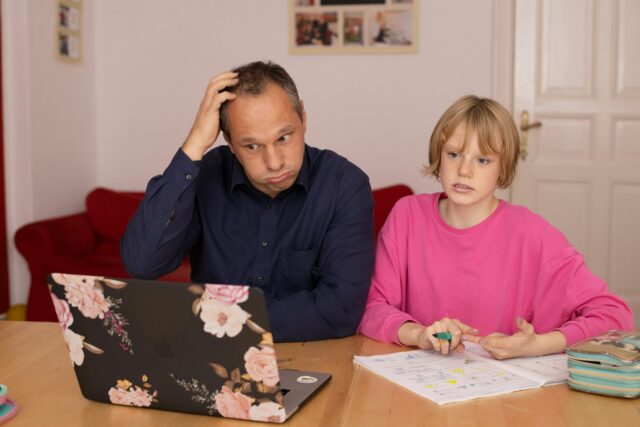Childhood experiences shape us in some pretty intense ways, and the emotional environment we grow up in can leave lasting marks on our personalities and behaviours.

If you find yourself relating to certain patterns or struggles, it might be worth exploring whether you experienced emotional abuse from a parent. If any of these experiences sound familiar to you, it’s important to talk with a licensed professional who can help you unpack what you’ve been through and give you tools and skills to overcome the trauma you’re still living with so you can move forward in a happier, healthier way.
1. You struggle with low self-esteem and self-worth.

Growing up with constant criticism, belittlement, or neglect can erode your sense of self-worth. You might constantly doubt yourself, feel inadequate, or believe you don’t deserve love and happiness. These negative beliefs can linger into adulthood, affecting your relationships and overall well-being.
2. You find it hard to trust people or let yourself get close to anyone.

Emotional abuse can damage your ability to trust people. If your parent was manipulative, inconsistent, or unreliable, you might find it hard to believe in people’s good intentions. This can lead to a fear of intimacy, difficulty opening up to people, and a tendency to keep people at arm’s length.
3. You tend to be a people-pleaser, even at your own expense.

To avoid conflict or disapproval, you might have learned to prioritise everyone else’s needs over your own. This pattern of people-pleasing can manifest as difficulty saying no, going along with things you don’t want, or sacrificing your own well-being to keep everyone happy.
4. You need constant external validation and approval.

Growing up without consistent validation and affection can create a deep-seated need for external approval. You might constantly seek reassurance from people, worry about what they think of you, and feel lost or insecure without their validation.
5. You struggle with anxiety, depression, or other mental health issues.

Emotional abuse can leave lasting psychological scars. You might experience chronic anxiety, depression, or other mental health challenges as a result of the trauma you endured. These conditions can affect your daily life, relationships, and overall well-being.
6. You have difficulty expressing your emotions or needs.

If your emotions were dismissed or invalidated as a child, you might have learned to suppress your feelings to avoid conflict or further hurt. This can lead to difficulty identifying and expressing your emotions, which can make it challenging to form healthy relationships and communicate effectively.
7. You tend to blame yourself for everything that goes wrong.

If you were constantly blamed or shamed for things that weren’t your fault, you might have internalised this pattern of self-blame. This can lead to a tendency to over apologise, take responsibility for things that are beyond your control, and struggle to assert your needs and boundaries.
8. You have a fear of abandonment or rejection.

Growing up with the threat of abandonment or rejection, whether real or implied, can create a deep-seated fear of being left alone or unwanted. This fear can manifest in clingy behaviour, a tendency to stay in unhealthy relationships, or an inability to tolerate even minor disagreements or conflicts.
9. You struggle with perfectionism and the need to control.

If you were constantly held to unrealistic expectations or faced harsh consequences for making mistakes, you might have developed a strong drive for perfectionism. This can manifest as an intense fear of failure, a need to control every aspect of your life, and an inability to relax or let go.
10. You have difficulty setting boundaries and saying no.

Growing up in an environment where your boundaries were constantly violated can make it difficult to assert your needs and say no to people. You might feel guilty or obligated to please everyone, even at the expense of your own well-being. This can lead to resentment, burnout, and a lack of control over your own life.
11. You are highly sensitive to criticism or rejection.
 Source: Unsplash
Source: Unsplash If you experienced frequent criticism or rejection from your parent, you might have developed a heightened sensitivity to negative feedback. This can manifest as taking constructive criticism personally, fearing rejection in relationships or work, and struggling to cope with even minor setbacks.
12. You experience flashbacks, nightmares, or other trauma-related symptoms.

Emotional abuse can be traumatic, and you might experience flashbacks, nightmares, or other symptoms related to the trauma. These can be triggered by certain events, situations, or even seemingly unrelated things. If you’re experiencing these symptoms, it’s important to seek professional help to process and heal from the trauma.
13. You have difficulty maintaining healthy relationships.

The emotional scars of abuse can affect your ability to form and maintain healthy relationships. You might struggle with trust issues, have a fear of intimacy, or repeat unhealthy patterns learned from your childhood. It’s important to recognise these patterns and seek support to develop healthier relationship skills.
14. You feel a sense of relief or freedom when you’re away from your parent.

If you feel a sense of lightness, peace, or freedom when you’re not around your parent, it might be a sign that their presence is emotionally draining or triggering for you. This feeling of relief can be a significant indicator that your relationship with your parent is not healthy and might be causing you harm.




